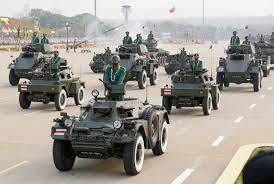Myanmar's Shadow Government Announces 'Defensive War'
Source: https://www.voanews.com/east-asia-pacific/myanmars-shadow-government-announces-defensive-war
BANGKOK - Myanmar’s shadow government declared a “defensive war” on Tuesday that is being viewed by analysts as a call to arms against the junta controlling the country.
The National Unity Government (NUG) was founded as a shadow government in the wake of February’s military coup by Myanmar’s national armed forces. The NUG is the main opposition group, consisting of ousted elected politicians and legislators that claim to be the country’s legitimate government.
After NUG Acting President Duwa Lashi La called in a video for a nationwide uprising, there have reports that government has increased its military security presence in the capital, Yangon.
Myanmar has been in crisis since the military takeover that prompted widespread opposition. The junta ousted the National League for Democracy party, the democratically elected government, and detained its leader, Aung San Suu Kyi.
Nationwide protests ensued, with hundreds of thousands resisting military rule and going on strike, spearheaded by the Civil Disobedience Movement (CDM). Clashes followed, with the military harshly cracking down on demonstrators and over 1,000 killed according to the monitoring group the Association Assistance for Political Prisoners (AAPP). The military says the number is much lower.
But as clashes have continued, rural areas of Myanmar, including ethnic minority regions, have been most affected. Government troops and ethnic armed organizations have engaged in sustained fighting, with reports of regular airstrikes and tens of thousands of displaced villagers.
A People’s Defense Force (PDF), made up of militia groups and anti-coup demonstrators, has also been created in the wake of the crackdown and is in alignment with the NUG.
Aung Thu Nyein, a political analyst, said previous claims of “D-Day” from other members of the NUG were deemed as hints of imminent attacks on junta forces, but yesterday’s announcement of a “defensive war” was more like a calling of arms.
“After the declaration of war, as some PDF members are already trained in ethnic areas, there is pressure for the NUG from the people to do something distinctive,” he told VOA.
The analyst added he expects more attacks and fighting in coming months.
A leader of a guerrilla force that says it has about 100 soldiers within Myanmar's ethnic controlled areas told VOA through a translator that he believes it’s the beginning of a large-scale civil war.
Loi Samsit, which isn’t his real name, used to work as a humanitarian worker. Now he’s a rebel soldier who claims he is in alliance with the PDF.
“That means war is about to come... We, the soldiers from the people, are former professionals, working with pens, now holding guns,” he said.
Tun-Aung Shwe, the NUG’s representative to the Commonwealth of Australia, reiterated the necessity for those opposing the coup to resist the junta.
“The announcement means that the NUG takes its national responsibility to protect its own people who are suffering a lot under the brutal repression of the military junta when the international community is watching and sharing their grave concerns on the situation,” he told VOA by email.
But the NUG representative played down the possibility of a full-blown civil war.
“I am expecting to see a well-coordinated, well-organized people revolution to the military junta and targeted attacks to the military and its pillars, including military communication and supply lines and security posts and also to see defections among the military personnel,” Shwe said.
“I don’t think there will be a full-blown civil war because of the significant difference in terms of resources between the military junta and civilian government,” he added.
Hudson Logan, a youth leader in the Area 21 Revolution group, a network tasked with assisting local PDF armies with new recruits and training, stressed that the “defensive war” has many components.
“It will look like nationwide resistant movement in all possible forms. Armed resistance is part of the nationwide uprising, which may also include mass protests, mass disobedience and [without] collaboration to [the] military administration,” he told VOA in a message.
Southeast Asian and western countries have called for peace and to refrain from violence.
The U.S. State Department has updated its travel alerts for citizens within Myanmar amid the NUG’s declaration.
Challenge expected at U.N. assembly
Zaw Min Tun, the Myanmar military spokesman, refuted reports about revolt attempts, saying the announcement was for attention amid the upcoming credentials challenge at the United Nations next week, Reuters reported.
At the 76th General Assembly session on September 14, Myanmar will be a hot topic, as the credentials committee, made up of nine countries, must recommend an entity to take the country's U.N. seat. The choice comes down to either the military junta or representatives of the former government.
After ASEAN, a 10-member union consisting of countries in the region, called an emergency meeting in April, a five-point consensus was developed in a bid to solve the Myanmar crisis. But a special envoy has yet to visit.
Analyst Aung Thu Nyein thinks the diplomatic front is key for the NUG because of insecurities between ethnic and anti-coup opposition groups, and that the war announcement is being used partly as a show of force.
“In my opinion, the NUG’s strength is at the diplomatic front and not with the military. They have been talking to the ethnic armed groups, but it seems not ready to form a unified alliance. It is untimely, as the ASEAN special envoy called a few days ago to cease hostilities from both sides. Definitely, it is the response to the special envoy before his visit to Myanmar,” he added.
Myanmar, formerly known as Burma, gained independence in 1948 from Britain, but most of its modern history has been governed under military rule.
In Myanmar's November general elections, the military claimed unsubstantiated electoral fraud. On February 1, the Myanmar military, also known as Tatmadaw, removed the democratically elected government. National League for Democracy leader Aung San Suu Kyi and President Win Myint were detained and have since been charged.












